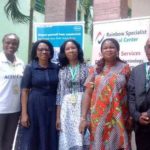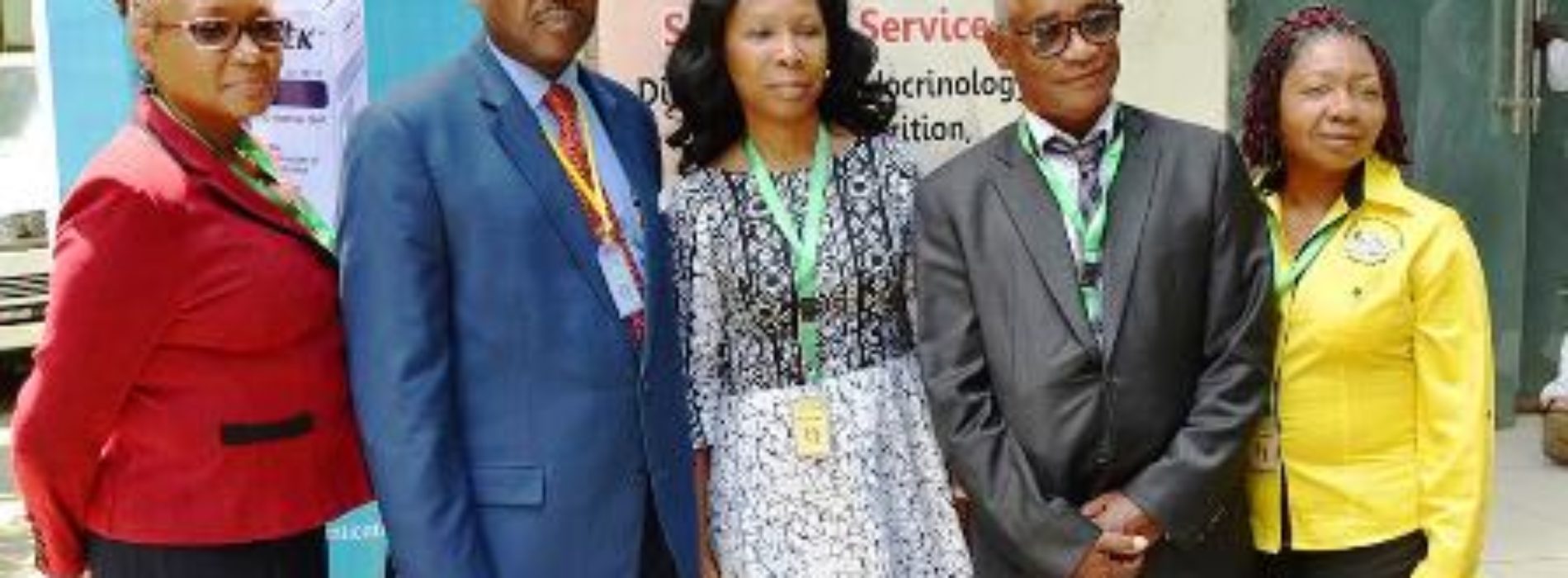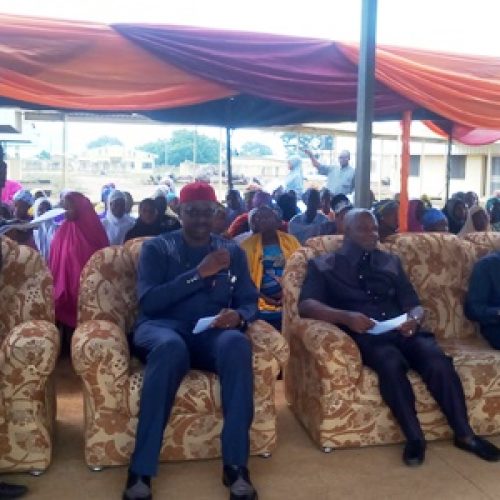FG to include diabetes in PHC service

L-R: Strategic Account Manager, Roche Products Ltd, Diabetes Care, Mrs Folashade Olufemi-Ajayi, Professor of Medicine, Endocrinology and Diabetology, College of Health Sciences, University of Abuja, Prof Felicia Anumah, Managing Director Rainbow Specialist Medical Centre, Dr Afoke Isiavwe, representative of the National Desk Officer, Diabetes, Federal Ministry of Health, Dr. Olanike Kehinde Akinkoye and Director, World Walk Foundation, Jamaica Chapter, Dr Owen Bernard at the workshop.
To stem the increasing incidence of diabetes in Nigeria, the Federal Ministry of Health has announced plans to double its efforts to strengthen the primary healthcare system to include diabetes management along with foot care – assessment and referral – into the existing health care service at the Primary care level.
In his opening remarks at the ongoing 6th Annual International Diabetes, Podiatry & Diabetes Foot Care workshop organized by Rainbow Specialist Medical Centre on Monday August 6, the National Desk Officer, Diabetes, Federal Ministry of Health, Dr. Alayo Sopekan described diabetes foot disease as a leading cause of hospital admissions in Nigeria, adding that its economic burden has become quite significant in view of the fact that most of the health expenditure in the country is from out of pocket expenses.
“In Nigeria, a large majority of people living with the disease have little or no knowledge of diabetes and its complications. It is estimated that the rate of foot ulcer among people living with diabetes is between 8.3% and 19% in the different zones of the country.
“The rate of amputation was also estimated to be as high as 53.2% in people with foot ulcer in some centres, thereby making diabetes foot the most common cause of non-traumatic amputation in the lower extremities in Nigeria.”
Dr. Sopekan who was represented by an official of the ministry’s Diabetes Desk, Dr. Olanike Kehinde Akinkoye assured of Government’s commitment in providing leadership for the prevention and control of diabetes and other non-communicable diseases through the Federal Ministry of Health “by strategically eliminating the risk factors, improving the management of these diseases as well as preventing their complications. “
He disclosed that the ministry had prepared the National Guideline for the Prevention, Control and Management of Diabetes in the country to ensure standardized protocol for medical care and patient self-management education to prevent the onset of complications among Nigerians living with the disease.
“Currently the FMOH is carrying out a Diabetes Awareness and Care project in two states of the federation (FCT and Imo state) through the support of the World Diabetes Foundation, WDF. These supports also include capacity building at the Primary Care level within the selected sites and medical outreaches. It is envisaged that the project would be scale up to other States of the federation.
“More so, the Federal Ministry of Health in collaboration with non-health Ministries, Department and Agencies developed the 7-year National Multisectoral Action Plan (NMSAP) for the prevention and control of NCDs to serve as a strategic guide for the national response to NCDs in Nigeria. The FMOH convened a high level stakeholder meeting to launch this document (NMSAP) on 6th August, 2019.”
Dr. Sopekan acknowledged the efforts of and Rainbow Specialist Medical Centre and the World Walk Foundation Jamaica Chapter for organizing the Diabetes and Podiatry workshop every year to help empower Health Care Practitioners in the management of the Diabetes Foot “and for standing with us in this fight against diabetes.”
Earlier in her welcome address, the workshop coordinator and Managing Director, Rainbow Specialist Medical Centre, Dr. Afokoghene Rita Isiavwe told guests that the medical centre has, in the last six years, been building local capacity to improve management and prevention of diabetes foot complications and raise awareness on proper foot care in persons living with diabetes mellitus; through much needed trainings via regular interactive workshop sessions.
She further informed that the second and fourth editions were organised through a jointly supported project from the World Diabetes Foundation and the Diabetes Podiatry Initiative Nigeria Project which offered the training to 12 hospitals in Lagos free of charge.
According to her, the workshop series had helped in raising awareness on Podiatry in Nigeria as the country had nothing on this specialty in Nigeria in terms of capacity building trainings before the series.
She further disclosed that the workshop series had become a Platform for Nigerian Podiatrists in Diaspora to launch out from, to reach out to other parts of Nigeria.
“Once word got out on this initiative, many Nigerian Podiatrists in Diaspora – Europe, North America, came in to join the program, with some new opportunities and strategic alliances and partnerships built with other health institutions and states to continue capacity building/podiatry missions which will eventually lead to more limbs and lives saved,” she said.
The Nigeria Podiatry initiative, she further said, had also produced a documentary on diabetes foot while over 1000 local health care workers had been trained. Also, a certification program on diabetes foot care at Rainbow Specialist Medical Centre had been successfully institutionalised.
“The theme for this year’s workshop is ‘Building the Diabetes Foot First Responders’.
“The theme … is very relevant and important, as having a strong diabetes foot care protocol at the primary care level will save more diabetes limbs and lives by ensuring Primary health care workers are able to recognize the high risk diabetes foot and know how to promptly triage them, to reduce delays in getting appropriate foot care services,” Dr. Isiavwe said.
In his remarks, the Director, World Walk Foundation Jamaica Chapter, Dr. Owen Bernard declared that foot care should not be seen as a minor matter. According to him, diabetes foot care is often an expensive venture and it requires a team effort which should be a multidisciplinary approach. Unfortunately, he said, there’s a dearth of podiatrists, the specialists who manage foot problems, worldwide.
“It makes sense to train as many people as possible so that we can deal with the problem of foot care, especially at the PHC level. We need to spend more time and money to prevent foot amputation,” he stressed.





0 Comments
No Comments Yet!
You can be first to comment this post!